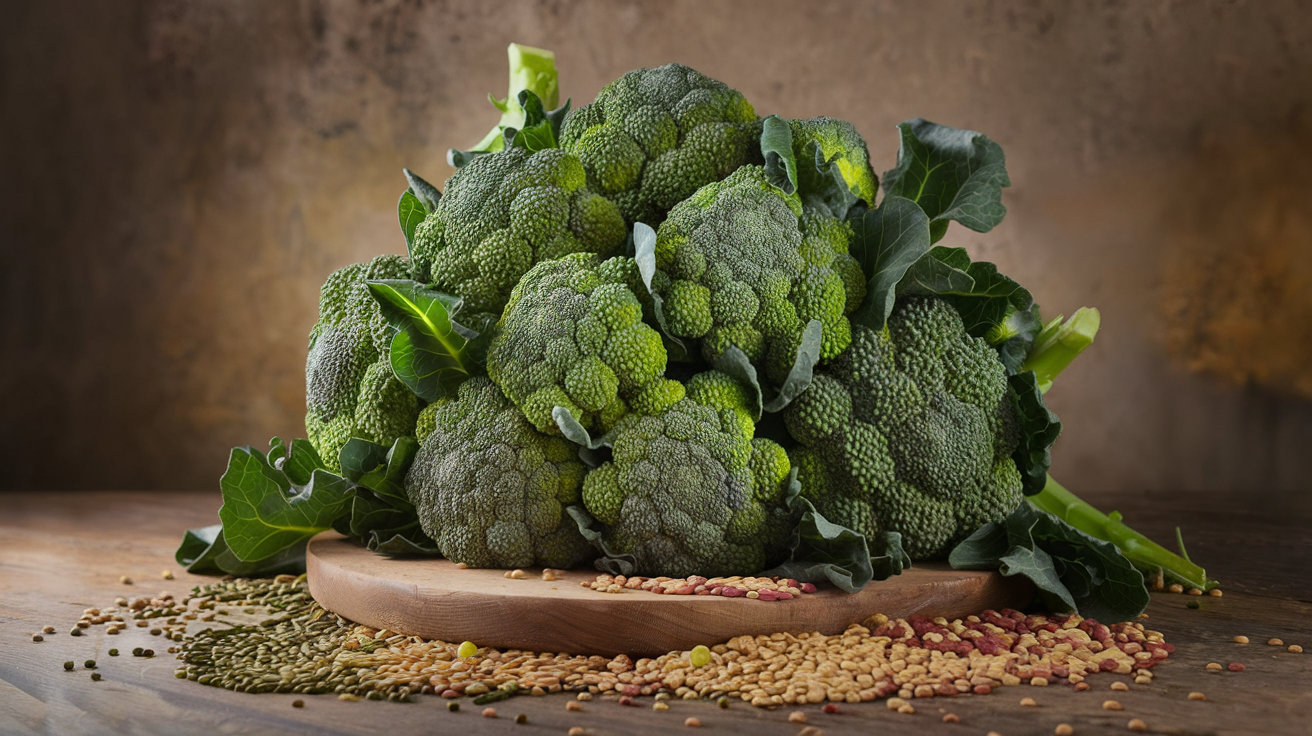Today, we’re exploring the fascinating world of broccoli seeds, unraveling the mystery behind their origin and production. Whether you’re a seasoned gardener or a curious food enthusiast, understanding where broccoli seeds come from can deepen your appreciation for this nutritious vegetable and enhance your gardening skills.
The Journey of Broccoli: From Plant to Seed
Broccoli seeds, like all plant seeds, are the result of a complex and beautiful natural process. At Rhys Garden, we believe that understanding this journey is crucial for anyone looking to grow their own broccoli or simply appreciate the wonders of nature.
To understand where broccoli seeds come from, we need to explore the plant’s life cycle:
- Germination: The journey begins when a broccoli seed sprouts.
- Growth: The plant develops leaves, stems, and eventually the familiar broccoli head.
- Flowering: If left unharvested, the broccoli head will develop into yellow flowers.
- Pollination: Bees and other insects pollinate the flowers.
- Seed formation: After pollination, seed pods develop and mature.
The Science Behind Broccoli Seed Production

Botanical Classification
Broccoli (Brassica oleracea var. italica) belongs to the Brassicaceae family, which includes other vegetables like cauliflower, cabbage, and kale. This classification is important for understanding seed production and cross-pollination issues.
From Flower to Seed
When a broccoli plant is allowed to flower, it undergoes a fascinating transformation:
- The tight green head loosens and elongates.
- Small yellow flowers bloom, attracting pollinators.
- After pollination, the flowers develop into seed pods.
- These pods, also known as siliques, contain the broccoli seeds.
The Role of Pollination
Pollination is crucial for seed production. While broccoli can self-pollinate, cross-pollination by insects often results in healthier, more vigorous seeds. At Rhys Garden, we encourage gardeners to create pollinator-friendly environments to support this natural process.
Commercial Broccoli Seed Production
Understanding commercial seed production can provide insights into the seeds we purchase for our gardens.
Specialized Farming Techniques
Commercial broccoli seed production involves:
- Selecting parent plants with desirable traits
- Controlled pollination to maintain genetic purity
- Careful timing of harvest to ensure seed maturity
- Specialized harvesting and cleaning equipment
Hybrid vs. Open-Pollinated Seeds
Two main types of broccoli seeds are available:
- Hybrid seeds: Result from crossing two different parent lines
- Open-pollinated seeds: Produced by natural pollination within the same variety
Each type has its advantages, and at Rhys Garden, we encourage gardeners to experiment with both to find what works best for their specific needs.
Growing Broccoli for Seed: A Gardener’s Guide
For those interested in saving their own broccoli seeds, here’s a step-by-step guide:
- Choose open-pollinated varieties for true-to-type seeds.
- Allow some broccoli plants to flower instead of harvesting the heads.
- Protect flowering plants from cross-pollination if growing multiple brassica varieties.
- Wait for seed pods to turn brown and dry on the plant.
- Harvest pods and extract seeds.
- Clean and dry seeds thoroughly before storage.
Tips for Successful Seed Saving
- Isolate different broccoli varieties to prevent cross-pollination.
- Select the healthiest plants for seed production.
- Properly label and date your saved seeds.
The Genetics of Broccoli: A Deeper Dive
Understanding the genetics behind broccoli can provide fascinating insights into seed production and plant breeding.
Genetic Diversity in Broccoli
Broccoli, like other brassicas, exhibits significant genetic diversity. This diversity is crucial for:
- Developing new varieties
- Improving disease resistance
- Adapting to different climates
Research conducted at universities like the University of California, Davis, has shown that this genetic diversity can be traced back to wild brassica species.
Breeding for Specific Traits
Plant breeders use genetic knowledge to develop broccoli varieties with specific characteristics:
- Heat tolerance
- Improved nutritional content
- Uniform head size
- Disease resistance
At Rhys Garden, we’re always excited to see new broccoli varieties that result from these breeding efforts.
The Environmental Impact of Broccoli Seed Production
As gardeners and environmental stewards, it’s important to consider the ecological aspects of seed production.
Sustainability in Seed Production
Sustainable seed production practices include:
- Water conservation techniques
- Integrated pest management
- Soil health maintenance
- Biodiversity promotion
Climate Change and Seed Production
Climate change poses challenges to broccoli seed production:
- Shifting growing seasons
- Increased pest pressures
- Extreme weather events
Adapting to these challenges is crucial for ensuring a steady supply of quality broccoli seeds.
Nutritional Value of Broccoli Seeds
While we typically eat broccoli heads, the seeds themselves offer nutritional benefits:
- High in protein
- Rich in omega-3 fatty acids
- Contain beneficial enzymes
Some health-conscious individuals incorporate broccoli seeds or sprouts into their diets for these nutritional advantages.
Frequently Asked Questions
To address common queries about broccoli seeds, we’ve compiled a list of frequently asked questions:
Q1: How long does it take for broccoli to produce seeds?
A: From planting to seed harvest, it typically takes about 100-150 days, depending on the variety and growing conditions.
Q2: Can I eat the broccoli after it has gone to seed?
A: While edible, broccoli that has gone to seed is usually tougher and more bitter than harvested heads. However, the flowers are edible and can add a nice touch to salads.
Q3: How many seeds does one broccoli plant produce?
A: A single broccoli plant can produce hundreds to thousands of seeds, depending on its size and health.
Q4: Are broccoli seeds genetically modified?
A: While genetically modified (GM) broccoli exists in research settings, as of 2024, there are no commercially available GM broccoli varieties. Most seeds available to home gardeners are not genetically modified.
Q5: How long can broccoli seeds be stored?
A: Properly stored broccoli seeds can remain viable for 3-5 years, sometimes longer under ideal conditions.
The Future of Broccoli Seed Production
As we look to the future, several trends and innovations are shaping broccoli seed production:
1. Climate-Resilient Varieties
Breeders are developing broccoli varieties that can thrive in changing climatic conditions, ensuring a stable seed supply for future generations.
2. Organic Seed Production
The demand for organic broccoli seeds is growing, leading to increased organic seed production practices.
3. Seed Banking
Efforts to preserve genetic diversity through seed banking are crucial for maintaining a wide variety of broccoli traits for future breeding programs.
4. Precision Agriculture in Seed Production
Advanced technologies like drone monitoring and precision irrigation are being applied to improve seed production efficiency and quality.
Conclusion
As we’ve explored, broccoli seeds are the result of a complex and fascinating natural process. From the careful selection of parent plants to the intricate dance of pollination, each seed represents nature’s ingenuity and the dedication of farmers and gardeners worldwide.
At Rhys Garden, we believe that understanding where our seeds come from deepens our connection to the food we grow and eat. Whether you’re planning to save your own broccoli seeds or simply appreciate the journey from seed to table, we hope this exploration has enriched your gardening knowledge.
Remember, every time you plant a broccoli seed, you’re participating in an age-old cycle of growth and renewal. Happy gardening, and may your broccoli harvests be bountiful!

Related Posts
Are Wild Flowers Perennial? Unveiling Nature’s Blooming Secrets
Growing Johnny Jump Up Seeds: A Gardener’s Guide to Viola Tricolor
The Art of Transplanting Japanese Maple